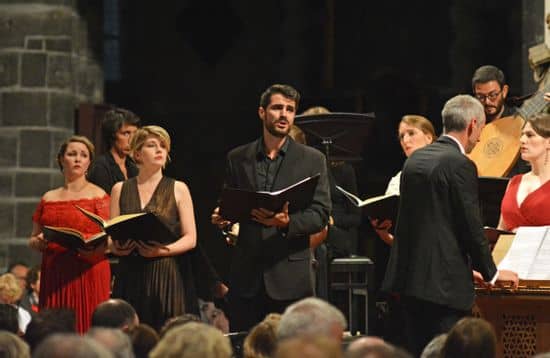Le chant d’Orphée
MARC-ANTOINE CHARPENTIER
Retired from the world in the 1680s, Marie de Guise does not seem to have given up the pleasure of music and entertainment. It is in this perspective that Marc-Antoine Charpentier wrote one of the most intense, expressive and delicious little operas: La Descente d’Orphée aux Enfers. Charpentier takes up this founding subject of lyric art, giving it an intensity that is out of all comparison with the small team he has at his disposal: about twenty musicians – the young team of the Maison de Guise. The beauty of each detail, the extreme care given to the voice and the expressive richness of the harmonies make this little opera one of the jewels of French lyric art. In addition to this little opera – most probably incomplete – two pieces by the same composer evoking purgatory are included in this program: first, the damned souls of the Motet pour les Trépassés for two choruses, then those imploring the help of the Virgin Mary in a lamentation that illustrates this intermediate realm.
Thus, the first act of the opera, with its pastoral atmosphere, as if evoking a paradisiacal golden age, is followed by the complaint of the suffering souls in purgatory, the same souls that open the second act of the opera: Titye, Tantalus and Ixion are three of those condemned to unceasing suffering, who welcome Orpheus to the Underworld.
It is in this purgatory that the song of Orpheus suddenly resounds: all the monsters, all the obstacles reputed to be insurmountable give way under the spell of this bewitching voice. Pluto, to whom he finally reaches, is himself deeply touched by this unheard-of harmony. Encouraged by his wife Proserpine, he finally gives in to Orpheus and allows him to lead his beloved back to earth on the condition that they do not exchange glances until they arrive there. Charpentier’s manuscript ends there.
Harmonia Mundi release May 2016
♢
PROGRAM
Marc-Antoine Charpentier
La Descente d’Orphée aux Enfers Acte I
Motet pour les Trépassés
Antiphona in honorem Beatae Virginis a redemptione captivorum
La Descente d’Orphée aux Enfers Acte II
